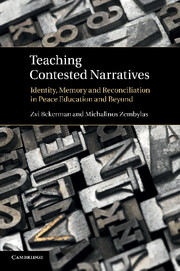Book contents
- Frontmatter
- Contents
- Acknowledgments
- Permissions
- Part I Introduction and theoretical underpinnings
- 1 Introduction
- 2 Problematizing peace education romanticism
- 3 On conflict, identity and more
- Part II Living and teaching contested narratives
- Part III Mourning, forgiveness and reconciliation
- Part IV Conclusions
- References
- Index
2 - Problematizing peace education romanticism
Published online by Cambridge University Press: 05 December 2011
- Frontmatter
- Contents
- Acknowledgments
- Permissions
- Part I Introduction and theoretical underpinnings
- 1 Introduction
- 2 Problematizing peace education romanticism
- 3 On conflict, identity and more
- Part II Living and teaching contested narratives
- Part III Mourning, forgiveness and reconciliation
- Part IV Conclusions
- References
- Index
Summary
So far we have tried to familiarize the reader with the sociopolitical and educational settings which will be discussed, with what we as researchers have done, and with how the book is organized. In this chapter we present some of our theoretical assumptions and directions. This is necessary, for descriptive and analytical choices are not epistemologically free. Being reflective on that which guides our theoretical approach hopefully betters our chances of being critical about our own perspectives, and equips the reader with the knowledge needed to approach our work critically. Our arguments might seem to be repetitive at times, and they are. This repetitiveness has two sides, though. First, it is inevitable because our critique extends over multiple theoretical approaches which have sustained for the most part a compartmentalized epistemology; responding to each and every theoretical approach requires that we reiterate some of our ideas. Second, repetitiveness is somewhat purposive, because we see in repetition an outstanding learning strategy which will hopefully keep the reader both alert and informed in a book which travels multiple theoretical territories.
Our theoretical underpinnings aim to widen the traditional understanding of peace educational issues and activities. First, we want the reader to know that we come from a philosophical and anthropological thinking that finds it difficult to consider nouns (e.g., “conflict”) and adjectives (e.g., “peaceful”) as “true” representations of the world. We are compelled to use representations for pragmatic reasons – otherwise we cannot be easily understood – and yet we know that these representations are what their names say, that is, “representations.” In this sense, peace and conflict are not just “things out there”; they have no predetermined or final forms that are simply reachable or erasable. This fundamental assumption inevitably leads to certain results that may prevent or promote the chances of peace education interventions. Let us explain our assumption some more.
- Type
- Chapter
- Information
- Teaching Contested NarrativesIdentity, Memory and Reconciliation in Peace Education and Beyond, pp. 24 - 43Publisher: Cambridge University PressPrint publication year: 2011



